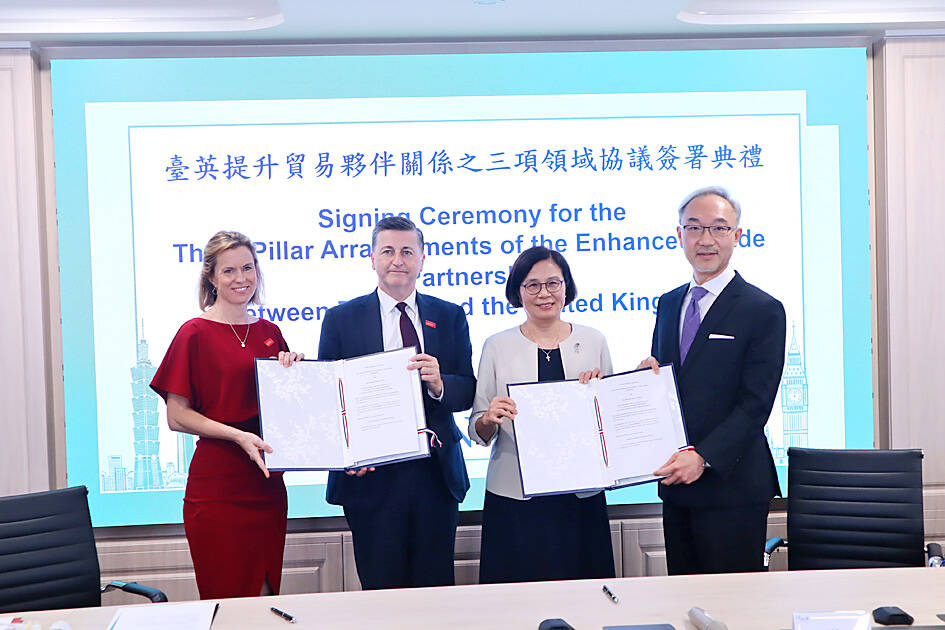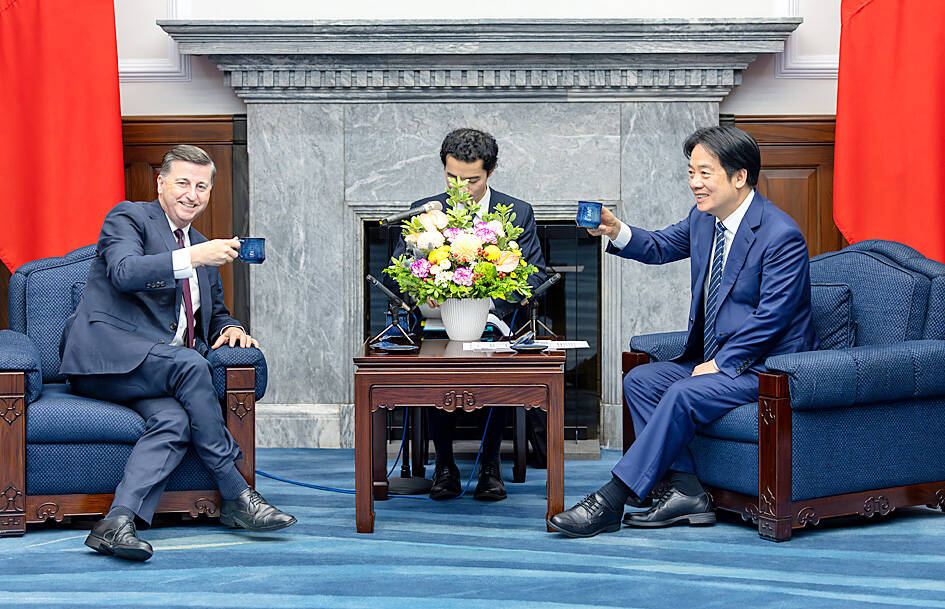Taiwan and the UK yesterday signed three agreements to enhance bilateral exchanges and cooperation in investments, digital trade, energy and net zero.
The “three pillar” agreements of the UK-Taiwan Enhanced Trade Partnership (ETP) were signed by Representative to the UK Vincent Yao (姚金祥) and his British counterpart Ruth Bradley-Jones at the Office of Trade Negotiations (OTN) in Taipei.
The ceremony was attended by visiting British Minister of State for Trade Policy and Economic Security Douglas Alexander and Taiwan’s top trade negotiator Yang Jen-ni (楊珍妮), who heads the OTN.

Photo courtesy of the British Office Taipei via CNA
The “three pillars” cover cooperation on investment, digital trade, and energy and net zero.
Alexander said each of the three pillars represents an opportunity.
“In clean energy, where Taiwan is already a major market for UK companies and where we see significant growth potential. In investment, where we are seeing increased interest from both sides to back strategically significant sectors such as technology and advanced manufacturing. And in digital trade, where our pilot project is demonstrating its immense value to businesses,” he said.

Photo: screen grab from the Presidential Office’s Flickr page
The UK-Taiwan ETP is a great example of this, and is “specifically referenced in the trade strategy,” he said, adding that it provides a “flexible trading arrangement to support the development of our trade and investment relationship in key sectors.”
The OTN and the British Office Taipei said the pacts would pave the way for an open, secure and fair digital trade environment for both sides.
It would also promote closer bilateral investment — especially in supporting women in business, and small and medium-sized enterprises competing in global markets — while helping Taiwan and the UK achieve net zero carbon emissions by 2050, they said.
The pacts were signed two years after the ETP framework was established in 2023 to focus on sectors with high growth potential.
Alexander yesterday also met with President William Lai (賴清德), where the latter expressed hope that the UK would openly support Taiwan’s bid to join the Comprehensive and Progressive Agreement for Trans-Pacific Partnership.
Lai thanked the British government for its support for peace and stability in the Taiwan Strait.
Lai said that the UK’s recently published “Strategic Defence Review” and “National Security Strategy,” which opposed any unilateral attempts to change the “status quo” in the Taiwan Strait, showed that Taiwan and the UK had aligned goals, and underscores the inseparability of security and prosperity in the Indo-Pacific region and transatlantic regions.
Alexander expressed the hope of deepening bilateral cooperation for more innovative collaboration and business success.
Additional reporting by Chen Yun

A preclearance service to facilitate entry for people traveling to select airports in Japan would be available from Thursday next week to Feb. 25 at Taiwan Taoyuan International Airport, Taoyuan International Airport Corp (TIAC) said on Tuesday. The service was first made available to Taiwanese travelers throughout the winter vacation of 2024 and during the Lunar New Year holiday. In addition to flights to the Japanese cities of Hakodate, Asahikawa, Akita, Sendai, Niigata, Okayama, Takamatsu, Kumamoto and Kagoshima, the service would be available to travelers to Kobe and Oita. The service can be accessed by passengers of 15 flight routes operated by

GIVE AND TAKE: Blood demand continues to rise each year, while fewer young donors are available due to the nation’s falling birthrate, a doctor said Blood donors can redeem points earned from donations to obtain limited edition Formosan black bear travel mugs, the Kaohsiung Blood Center said yesterday, as it announced a goal of stocking 20,000 units of blood prior to the Lunar New Year. The last month of the lunar year is National Blood Donation Month, when local centers seek to stockpile blood for use during the Lunar New Year holiday. The blood demand in southern Taiwan — including Tainan and Kaohsiung, as well as Chiayi, Pingtung, Penghu and Taitung counties — is about 2,000 units per day, the center said. The donation campaign aims to boost

ENHANCING EFFICIENCY: The apron can accommodate 16 airplanes overnight at Taoyuan airport while work on the third runway continues, the transport minister said A new temporary overnight parking apron at Taiwan Taoyuan International Airport is to start operating on Friday next week to boost operational efficiency while the third runway is being constructed, the Ministry of Transportation and Communications said yesterday. The apron — one of the crucial projects in the construction of the third runway — can accommodate 16 aircraft overnight at the nation’s largest international airport, Minister of Transportation and Communications Chen Shih-kai (陳世凱) told reporters while inspecting the new facility yesterday morning. Aside from providing the airport operator with greater flexibility in aircraft parking during the third runway construction,

American climber Alex Honnold is to attempt a free climb of Taipei 101 today at 9am, with traffic closures around the skyscraper. To accommodate the climb attempt and filming, the Taipei Department of Transportation said traffic controls would be enforced around the Taipei 101 area. If weather conditions delay the climb, the restrictions would be pushed back to tomorrow. Traffic controls would be in place today from 7am to 11am around the Taipei 101 area, the department said. Songzhi Road would be fully closed in both directions between Songlian Road and Xinyi Road Sec 5, it said, adding that bidirectional traffic controls would